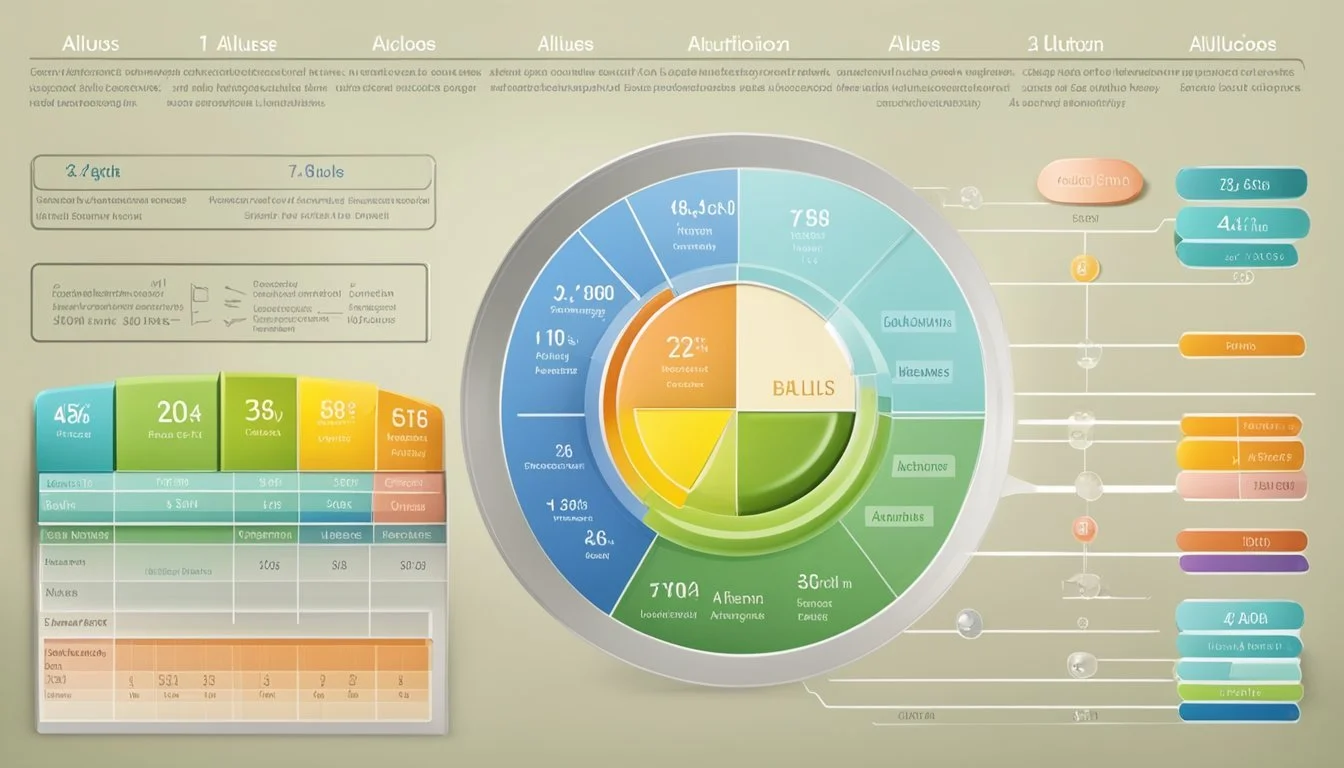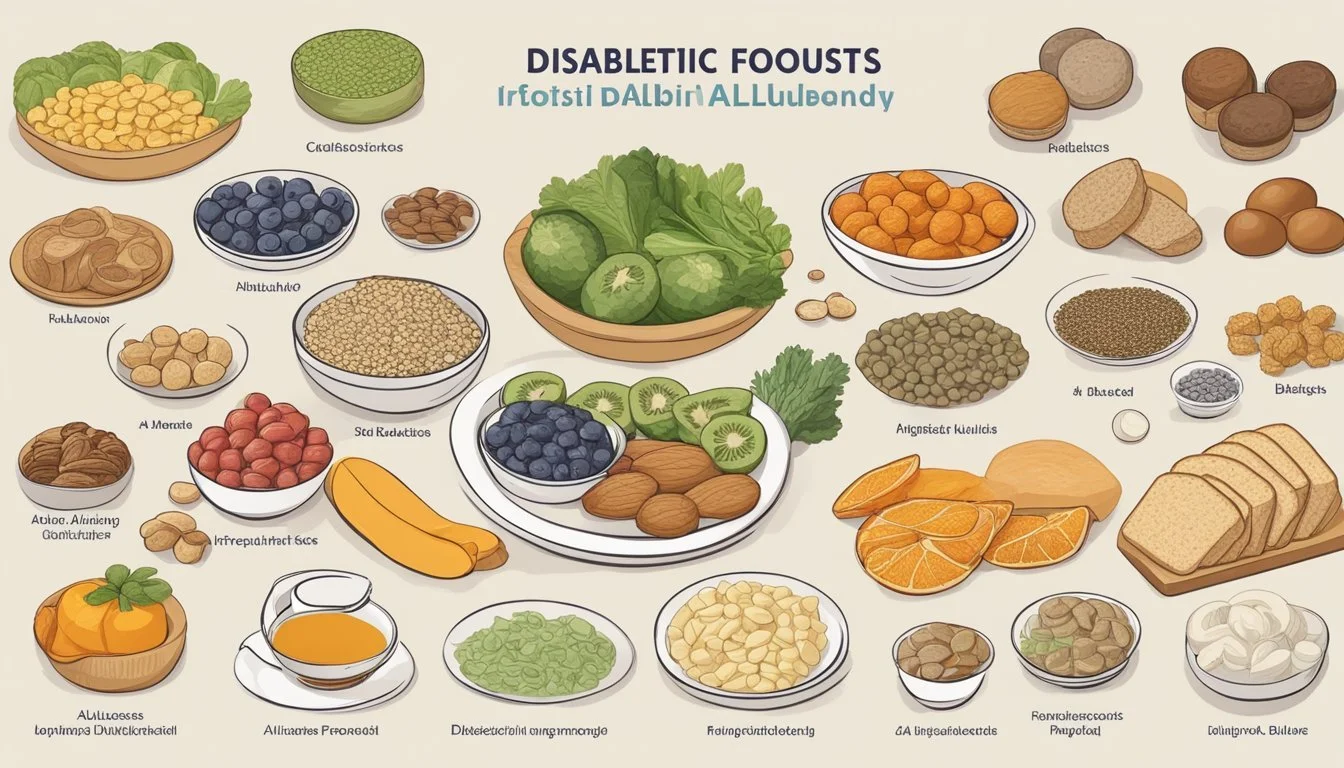Can Diabetics Eat Allulose?
Understanding This Sugar Alternative
People living with diabetes often struggle to find sweeteners that don’t spike their blood sugar levels. Allulose, a low-calorie sweetener, is a promising option as it does not affect blood glucose or insulin levels, making it suitable for people managing diabetes. Additionally, it doesn't cause tooth decay, which is an added benefit.
Allulose is naturally found in small amounts in foods such as figs, raisins, and maple syrup. Studies suggest that it might also help control glucose levels and improve insulin sensitivity, which could be particularly beneficial for those with type 2 diabetes. This sets it apart from many other sweeteners currently available.
While research is still ongoing, initial findings are encouraging. Experts believe that allulose could be a powerful tool in managing diabetes and reducing the risk factors associated with it. As more people look for health-conscious sweetening options, allulose stands out as a potentially safe and effective choice.
What is Allulose?
Allulose, also known as D-allulose or D-psicose, is a low-calorie sugar substitute that provides a similar taste experience as sugar but with significantly fewer calories. It occurs naturally in small quantities in various fruits and is gaining popularity as a healthier alternative to traditional sweeteners.
Chemical Composition and Properties
Allulose is a monosaccharide similar to fructose and glucose. It has the same chemical formula as fructose (C6H12O6) but differs in structure, leading to unique properties. Despite being only 70% as sweet as sugar, it has a similar texture and bulk, making it useful in various culinary applications.
Importantly, allulose does not significantly raise blood glucose or insulin levels, distinguishing it from many other sweeteners. This feature makes it an appealing option for those monitoring their blood sugar levels, such as people with diabetes.
Natural Occurrence in Fruits
Allulose is naturally found in small quantities in a variety of fruits. Figs, raisins, and jackfruit are some of the common sources. It is considered a "rare sugar" due to its limited presence in nature.
The extraction process involves converting corn-derived fructose into allulose using enzymatic methods. This process ensures that allulose retains its sweetness while offering fewer calories than regular sugar.
Comparison With Other Sweeteners
Compared to traditional sweeteners like sucrose (table sugar), allulose offers several benefits. While regular sugar significantly impacts blood glucose levels, allulose does not. This characteristic gives it an edge for those with diabetes or prediabetes.
Other sugar substitutes, such as aspartame and sucralose, often come with aftertastes or potential health concerns, whereas allulose tends to closely mimic the taste and texture of sugar without these issues. Additionally, unlike some artificial sweeteners, allulose does not cause tooth decay, aligning it with the needs of dental health-conscious consumers.
Allulose provides a versatile, lower-calorie sweetening option with negligible effects on blood sugar levels, making it a suitable choice for people with specific dietary needs.
Health Implications of Allulose in Diabetics
Allulose has gained attention for its potential benefits in blood glucose management for diabetics. This section details the impact of allulose on blood glucose and insulin levels, compares how it is metabolized versus fructose and glucose, and explores recent research in diabetes management.
Impact on Blood Glucose and Insulin Levels
Allulose may help lower blood glucose levels in individuals with diabetes. Studies have shown that consuming allulose with a meal can reduce the spike in blood glucose levels post-ingestion.
In one study, participants who consumed allulose with a standard sugar load experienced a reduction in plasma glucose at 30 minutes compared to a placebo.
This glucose-lowering effect is vital for diabetics managing their blood sugar levels.
Allulose Vs. Fructose and Glucose Metabolism
Allulose is a rare sugar, much like fructose, yet it is metabolized differently. Unlike glucose, which can cause rapid spikes in blood sugar, allulose does not significantly impact blood glucose levels.
Fructose is metabolized in the liver and can lead to fat accumulation when consumed in large amounts. Allulose, on the other hand, is mostly excreted unchanged in the urine, minimizing its caloric contribution and impact on blood sugar.
Research on Allulose and Diabetes Management
Research indicates that allulose may be beneficial in diabetes management. Studies have examined various populations, including both white and African-American subjects, to assess its efficacy.
For instance, a large study found that allulose consumption led to a dose-dependent reduction in plasma glucose levels when administered with a standard sugar load.
Additional research suggests that allulose could play a role in reducing long-term insulin resistance, making it a viable alternative for sweetening foods without adversely impacting blood glucose.
In summary, these points offer a clear perspective on allulose's potential role in diabetic health management.
Allulose Safety and Regulatory Status
Allulose is considered safe for consumption, with regulatory authorities outlining specific guidelines and classifications related to its use. The FDA's approval and its status as a Generally Recognized as Safe (GRAS) ingredient solidify its position in the market. Additionally, its classification as a rare sugar further helps in understanding its unique properties.
FDA's Stand on Allulose
The Food and Drug Administration (FDA) has given allulose the green light as a sugar substitute. This approval is significant as it highlights the safety of allulose and its suitability for people with diabetes. The FDA recognizes allulose as contributing to weight control, diabetes management, and prevention of tooth decay. By approving this rare sugar, the FDA has provided consumers with more options to reduce traditional sugar intake.
General Recognized as Safe (GRAS) Status
Allulose has achieved the status of "Generally Recognized as Safe" (GRAS) by the FDA. This status indicates that experts consider allulose safe based on its long history of common use in food or on the results of scientific research. Foods labeled with GRAS ingredients are deemed safe under the conditions of intended use, ensuring consumer safety. The GRAS status of allulose means it can be used in various food products without posing health risks.
Understanding Rare Sugar Classification
Allulose is classified as a rare sugar, which distinguishes it from more common sugars like glucose or sucrose. Rare sugars are naturally occurring monosaccharides found in small quantities in certain foods such as caramels, raisins, and ketchup. The classification as a rare sugar acknowledges its unique metabolic properties, such as its minimal impact on blood glucose levels. This makes allulose particularly appealing for people managing diabetes or those seeking alternatives to traditional sugars.
Nutritional Profile of Allulose
Allulose is a low-calorie sweetener with unique attributes that make it appealing for individuals with diabetes. It provides sweetness similar to sugar but has significantly fewer calories, offering potential benefits for weight management.
Caloric Content and Sweetness Level
Allulose delivers approximately 0.2 calories per gram, which is about 95% fewer calories compared to sucrose. This makes it an attractive option for those looking to reduce their caloric intake without sacrificing sweetness.
Relative Sweetness: Allulose has about 70% of the sweetness of sucrose. This means that while it tastes sweet, a slightly larger quantity may be needed to match the sweetness level of regular sugar.
Caloric Content: 0.2 kcal/g
Relative Sweetness: 70% of sucrose
Allulose's low-calorie profile coupled with its near-sugar sweetness makes it suitable for various applications, such as in beverages, baking, and desserts.
Allulose and Obesity
Research suggests that allulose may have beneficial effects on body weight management. Studies have indicated that allulose can aid in reducing fat accumulation and improving overall metabolic health, which is crucial for individuals struggling with obesity.
Animal studies have shown promising results, such as decreased body fat and improved insulin sensitivity. Allulose may help in controlling weight by lowering the calories consumed without affecting the enjoyment of sweet foods.
Insulin Sensitivity: Can increase
Fat Accumulation: May decrease
These attributes make allulose a potentially effective tool for managing obesity, as it allows for a reduction in calorie intake while maintaining sweetness in the diet.
Incorporation into Diabetic Diets
Allulose can be a beneficial addition to diabetic diets due to its low-calorie content and the absence of significant blood sugar spikes. The following sections outline how allulose fits into various low-carbohydrate dietary frameworks.
Compatibility With Low-Carbohydrate Diets
Keto and Paleo: Allulose is a popular choice among keto and paleo diet followers. Since it has almost no net carbs, it doesn't interfere with ketosis or paleo guidelines focused on whole, unprocessed foods.
Low-Calorie and Diabetes-Friendly: Allulose contributes only 0.2 to 0.4 calories per gram, significantly lower than regular sugar's 4 calories per gram. This makes it an excellent option for those on calorie-restricted or diabetes-friendly diets.
Impact on Blood Sugar: Unlike other sweeteners, allulose doesn't cause a rapid increase in blood glucose levels, making it safe for diabetics. Research has indicated that it may even help improve glucose tolerance.
It blends well in various recipes, making it an adaptable ingredient for those looking to reduce their sugar intake while maintaining sweetness in their diet.
Common Applications and Usage
Allulose, a low-calorie sugar substitute, is gaining popularity for its minimal impact on blood sugar levels. It is particularly useful in various food preparations both on an industrial scale and for everyday home cooking.
Role in Processed Foods and Baked Products
Allulose is widely used in processed foods and baked products. Major food manufacturers incorporate allulose into products like bars, cookies, and cereals to reduce the total sugar content without compromising sweetness. Because allulose provides only 0.2 to 0.4 calories per gram, it is an attractive alternative sweetener for those looking to manage their calorie intake.
In baking, allulose can effectively replicate the properties of table sugar, such as aiding in browning and moisture retention. This makes it suitable for baked goods such as cakes, muffins, and bread. Additionally, allulose is often included in ice creams and dairy products, providing sweetness without the added calories of sugar. Frosting and other sweet spreads also benefit from allulose's properties, maintaining texture and flavor while offering a healthier option.
Everyday Use in Home Cooking
In home cooking, allulose serves as an excellent substitute for traditional sugar in various recipes. Coffee and tea drinkers can sweeten their beverages with allulose without worrying about the spike in blood sugar levels. Its similarity in taste to regular sugar makes it a convenient option for sweetening foods like yogurt and oatmeal.
Baking enthusiasts at home can use allulose in place of sugar to make cookies, cakes, and bread. Its ability to mimic the effects of sugar in recipes ensures that baked goods turn out moist and flavorful. When preparing sauces or dressings, allulose can be used to balance flavors, similar to how molasses or maple syrup might be used, without the added sugars.
In summary, allulose is a versatile ingredient that can be easily integrated into both commercial food production and home cooking, helping those who need to manage their sugar intake.
Possible Side Effects and Intolerance
Consuming allulose can lead to certain side effects, especially when ingested in large quantities. Understanding how it affects the gastrointestinal system and the importance of moderation is crucial for those considering adding it to their diet.
Gastrointestinal Impact and Allergy
Allulose can cause gastrointestinal discomfort if consumed in significant amounts. Common symptoms include bloating, gas, and diarrhea. These effects are similar to those caused by other sugar substitutes.
Individuals may experience these symptoms because allulose passes through the body largely undigested. This can alter the balance of gut bacteria, leading to increased gaseousness and bloating.
Although rare, some people might experience an allergic reaction to allulose. Signs of an allergic reaction include itching, swelling, and difficulty breathing. It is essential to be aware of these potential reactions and consult a healthcare provider if severe symptoms occur.
Moderation in Consumption
Moderation is key when incorporating allulose into the diet. It is generally safe to consume in small quantities, but excessive intake can heighten the risk of digestive issues. Experts recommend starting with small amounts to assess individual tolerance.
For most people, consuming around 15 grams or less per day helps avoid adverse effects. Maintaining a balanced diet and not relying solely on allulose for sweetness can prevent gastrointestinal discomfort.
Monitoring intake and paying attention to the body's signals can mitigate potential side effects, making allulose a viable option for those seeking lower-calorie sweeteners.
Sourcing and Availability of Allulose
Allulose is commonly derived from natural sources like fruits such as figs and raisins, or it can be synthesized enzymatically. Its availability across grocery stores varies, and selecting the right brand ensures quality and safety.
Identifying Quality Allulose Brands
When choosing allulose, brand reputation is critical. Reliable brands often provide detailed product information and adhere to stringent quality controls.
Look for manufacturers that offer clear labeling and disclose their extraction processes. Some trusted names in the market include Tate & Lyle, which is known for its high-quality sweeteners, and Bonumose, specializing in rare sugars.
It's important to verify that the product is non-GMO and free from additives. Customer reviews, certifications, and third-party testing further ensure that you are purchasing a trustworthy product.
Accessibility in Markets
Allulose's availability in markets has expanded significantly. It can be found in many grocery stores and health food outlets. Large retailers such as Walmart and Whole Foods often carry it. Online platforms like Amazon make it easier to access various brands and sizes.
Despite its increasing presence, the price can vary, and it is often higher than traditional sweeteners. Packaging sizes range from small packets to bulk containers, catering to different consumer needs.
Specialty health stores may offer a broader selection. It is beneficial to compare prices and check for bulk-buy options to find the best deals.
Emerging Research and Future Prospects
Recent studies have highlighted the potential benefits of allulose in diabetic management. These upcoming explorations and trials may expand its applications and improve our understanding of its effects.
On-Going Clinical Trials
Several clinical trials are being conducted to evaluate the efficacy of allulose in managing blood glucose levels and insulin response. For instance, a randomized crossover study has shown that a D-allulose-containing syrup can improve glucose tolerance.
Participants in these studies are monitored using continuous glucose monitoring systems (isCGMs). Initial results suggest that incorporating D-allulose into diabetic diets may help control postprandial glucose levels, offering a promising alternative to traditional sweeteners.
Expansion into New Food Categories
Allulose is gaining traction as a versatile sweetener in various food products, beyond its current use in items like ketchup and caramels. The U.S. FDA has recognized allulose as Generally Recognized As Safe (GRAS), paving the way for its inclusion in more food categories.
Manufacturers are exploring its potential in low-calorie snacks, baked goods, and beverages. With 70% of the sweetness of sucrose but only 0.4 kcal/g dietary energy, allulose offers a significant advantage for those looking to reduce sugar intake while maintaining taste.









